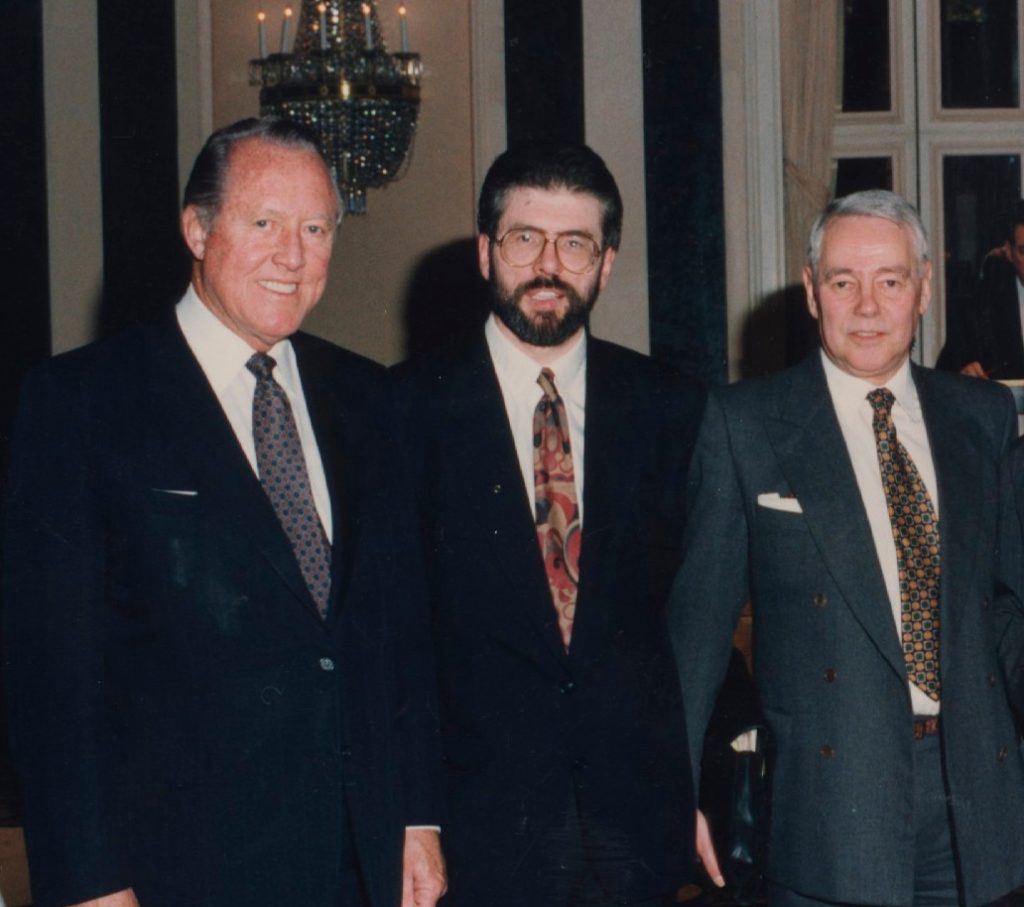While it may take a village to raise a child, it took the collaboration of three governments, eight political parties, several thousand dedicated individuals, and 1.7 million voters to achieve lasting peace in Northern Ireland. The Good Friday Agreement, signed on April 10, 1998, ended the violence and political conflict in Northern Ireland that had persisted since the late 1960s.
The road to peace is a compelling story that involved many committed people working behind the scenes. One such key player was Niall O’Dowd, the founder of this magazine. O’Dowd’s unique strength was his ability to connect with people. He believed peace was possible and with the support of his friend, now brother-in-law, Ciaran Staunton, he convinced a small group of influential Americans to travel to Ireland to encourage the IRA to pursue peace and call for a ceasefire.
Chuck Feeney, the renowned businessman and philanthropist, eagerly joined the cause, and soon after, Trade Union executive Joe Jamison, and former Connecticut Congressman Bruce Morrison followed suit.
O’Dowd also found a supporter in Bill Flynn, the head of Mutual of America, a U.S. pension and retirement company headquartered on Park Avenue. Flynn, whose parents came from counties Mayo and Down, had been to Ireland several times, and Mutual had sponsored a Conflict Resolution Conference in Derry the year before, so soon he was on board and he was able to bring the National Committee on American Foreign Policy (NCAFP) into the mix.
Dr. Carol Rittner, a Sister of Mercy and Director of the Elie Wiesel Foundation for Humanity had introduced Flynn to Dr. George Schwab, the founder and former President of NCAFP, a nonprofit organization that promotes understanding of U.S. foreign policy. With Schwab’s and Rittner’s guidance, Flynn played a significant philanthropic role in sponsoring landmark events that brought together leading intellectuals and engaged citizens. He and O’Dowd arranged to convene the Northern Ireland Peace Conference at the Waldorf Astoria Hotel in New York in January 1994, under the banner of the NCAFP. Their immediate goal was to secure a 48-hour visa waiver for Sinn Féin leader Gerry Adams to attend.
O’Dowd understood that negotiations could not move forward unless all parties in the conflict were guaranteed official American support. To prepare his team, he had already established a secret backchannel linking Sinn Féin in Belfast to Ted Kennedy on Capitol Hill and the National Security Council working within the Clinton White House.
As George Mitchell, the U.S. Special Envoy for Northern Ireland wrote in his book, Making Peace, President Clinton’s approval of Gerry Adams’s visa opened the way forward. Adams’s trip to the United States led to the IRA ceasefire and paved the way for inclusive negotiations.
To promote the conference, and bolster American support for peace, Flynn ran advertisements in The New York Times. The conference was a media sensation and paved the way for other events in New York featuring Unionist leaders such as James Molyneaux and David Trimble of the Ulster Unionist Party, the Reverend Dr. Ian Paisley, head of the Democratic Unionist Party.
In his memoir, An Irish Voice, O’Dowd acknowledged Mutual’s role in cultivating trust with Loyalist leaders. “From the first meeting in Belfast, an entire outreach from Irish America to Loyalism commenced, spurred by Bill Flynn and carried forward by his successor as CEO of Mutual of America, Tom Moran, and with the great help of Mutual’s Senior Vice President Ed Kenney.”
Flynn and Moran hosted a steady stream of visitors from Belfast, Dublin and London who were directly involved in the peace process. Washington dignitaries also attended the many events at Mutual headquarters on Park Avenue. The hospitable environment created by Flynn and Moran facilitated dialogue and trust-building among the participants.
In recognition of his extraordinary work and commitment to the peace process, the NCAFP’s Executive Committee established the William J. Flynn Initiative for Peace Award and named Bill Flynn as the first recipient in 1997. Over the years, both Flynn and Moran received numerous awards from the Irish-American community. Both men passed away a few months apart in 2018.
This year, to celebrate the 25th anniversary of the Good Friday Agreement, the Flynn Peace Award was presented to President Bill Clinton by Irish American organizations and on behalf of the American Foreign Policy (NCAFP) by Vice Chair Nancy Soderberg. This prestigious Friends of Sinn Féin event on April 3 in New York City was a reminder of the pivotal role played by Flynn, Moran, Kenney and others in bringing peace to Northern Ireland.


Leave a Reply